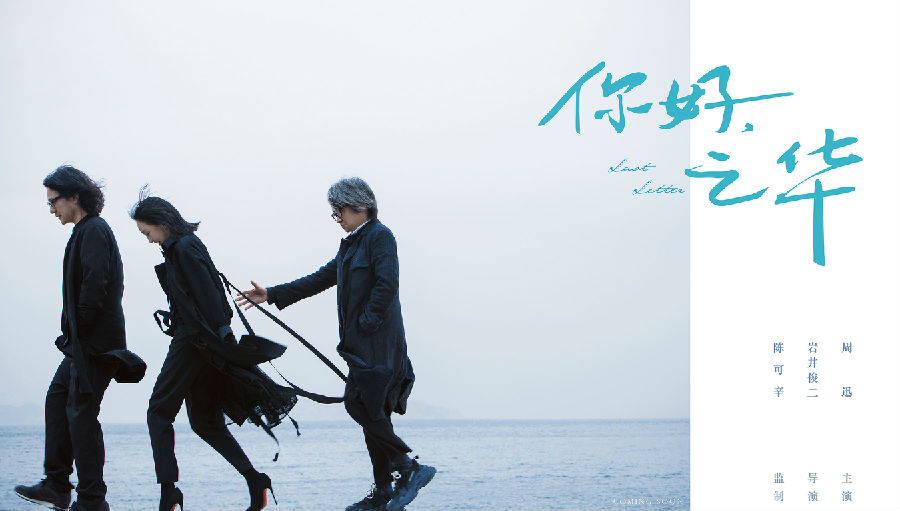岩井俊二的中国版《情书》
Many young people may write a letter to express their love when they have a crush on somebody. However, for famous Japanese director Shunji Iwai, 55, love letters are for more than just showing affection; they're about recalling youth and beauty.
不少年轻人都会向爱慕之人写信表达爱意。然而,对于55岁的日本著名导演岩井俊二而言,情书不仅仅是表达爱意的方式,也是青春与美好的回忆。

Recently, a poster for Iwai's new film Last Letter, which will come out in Chinese cinemas on Nov 11, was unveiled. It features Iwai, Chinese actress Zhou Xun, and Hong Kong producer Peter Chan. In the poster, the three stand by an ocean as they look off into the distance. It seems to be a tribute to Iwai's previous works, as it brings back the memory of the sad woman watching the blue sky from his classic 1995 film Love Letter, the Global Times noted.
将于11月11日登陆中国院线的岩井俊二新片《你好,之华》近期发布了一幅海报。海报是岩井俊二、中国女演员周迅以及香港制片人陈可辛的特写。海报中,三人站在海边眺望远方。《环球时报》指出,这张海报似乎是在向岩井俊二先前的作品致敬,让人回想起其1995年的经典电影《情书》中,一位悲伤的女子仰望蓝天的一幕。
The two movies are both about exchanging letters that reveal a simple but moving love story about a woman, who looks back on the past as she tries to get on with her life.
两部电影都通过交换情书的情节,揭开了一段简单动人的爱情故事:一位女子在回首往事的同时,也在努力过好自己的余生。
Although many characters in his movies learn to move on, Iwai himself loves to hold on to the past. The scenes in his movies mainly come from his own memories.
尽管岩井俊二电影中的不少角色都学会了继续前行,但他自己却喜欢沉浸在过去之中。电影中的大多数情景都来源于他自己的回忆。
Take Love Letter for example: the female protagonist Hiroko Watanabe lies in the snow and doesn't say a word in the first two minutes of the film. This beautiful scene instantly became an iconic image for literary films. Iwai got the inspiration when he saw a girl crying alone in the winter during a car journey. Indeed, many scenes in his movies are "a comprehensive expression of what I have experienced in my past life," Iwai told BBC News.
以《情书》为例:影片开场的前两分钟,女主角渡边博子躺在雪地中,一言不发。这美丽的场景当即便成为了文艺片标志性的一幕。这一幕的灵感来源于岩井俊二在一次冬日驾车旅行中所遇见的一位独自哭泣的女孩。电影中的不少镜头都是“我过往人生经历的综合表现,”岩井俊二在接受BBC新闻采访时表示。
Besides being a film director, screenwriter and novelist, Iwai is also a composer. He began to study the piano by himself when he was at college. "His music is light and pure, much similar to his soft-spoken personality," Shenzhen Daily reported.
除了电影导演、剧作家、小说家的身份之外,岩井俊二也是位作曲家。他上大学时开始自学钢琴。据《深圳日报》报道“他的音乐轻柔纯净,和他温和的个性十分相似。”
"Whatever I create, the only difference is the artistic form and my conception of the world is the same ... Something that cannot be bought with money is the most important, such as a person's growth, which relies on day-to-day effort," Iwai told Shenzhen Daily.
“不论我创作何种作品,它们唯一的区别就在于艺术形式,我对于世界的认知是一样的……最重要的是金钱买不来的东西,比如个人的成长,需要日复一日的努力,”岩井俊二在接受《深圳日报》采访时表示。













